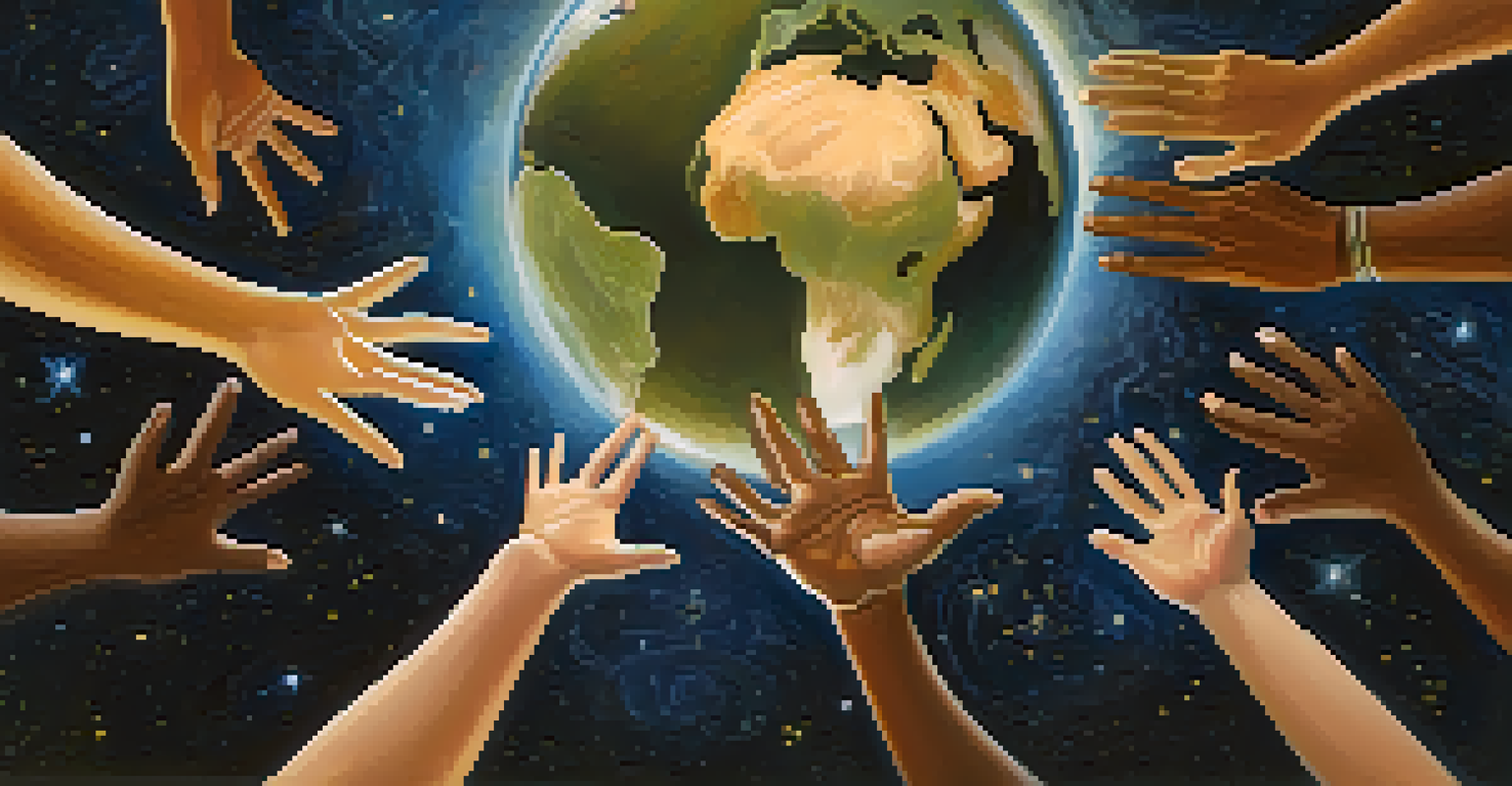Interconnectedness: Spirituality's View on Global Issues Today

Understanding Interconnectedness in Spirituality
At its core, interconnectedness emphasizes the idea that everything in the universe is linked. This spiritual perspective suggests that our actions, thoughts, and feelings have a ripple effect on the world around us. Just as a stone creates ripples in a pond, our individual choices can impact global societal issues.
We are not isolated beings; we are all interconnected and interdependent.
Many spiritual traditions teach that recognizing this interconnectedness fosters compassion and empathy. When we see ourselves as part of a larger whole, we naturally become more inclined to care about others' well-being. This sense of unity can inspire collective action in addressing global challenges.
In today’s world, where issues like climate change, poverty, and social injustice prevail, embracing interconnectedness can lead to more holistic solutions. By understanding that we're all in this together, we can work collaboratively to create a better future for everyone.
The Role of Spirituality in Addressing Climate Change
Climate change is one of the most pressing global issues we face, and spirituality offers a unique lens to view this challenge. Many spiritual practices encourage a deep respect for nature, reminding us that we are stewards of the Earth. This perspective can motivate individuals to adopt more sustainable lifestyles and advocate for environmental policies.

Spirituality often emphasizes the sacredness of the planet, fostering a sense of responsibility toward its preservation. When people view nature as part of a divine creation, they may feel a greater urgency to protect it. This shift in mindset can lead to grassroots movements that drive significant change.
Interconnectedness Drives Compassion
Recognizing our interconnectedness encourages empathy and collective action to address global challenges.
Furthermore, spiritual communities can serve as powerful platforms for raising awareness about climate issues. By uniting people under a common purpose, these groups can amplify their voices and influence policy decisions, demonstrating how spirituality can play a pivotal role in the fight against climate change.
Empathy and Global Health Crises Through a Spiritual Lens
Global health crises, like pandemics, highlight the need for empathy and collective action. Spirituality teaches us to care for one another, transcending geographical and cultural boundaries. By fostering empathy, we can build stronger support systems that address health disparities and promote well-being.
The greatness of a nation and its moral progress can be judged by the way its animals are treated.
In spiritual traditions, the idea of service to others is paramount. This principle encourages individuals to help those in need, particularly during crises. Whether through volunteering or simply offering emotional support, these acts of kindness can significantly impact communities facing health challenges.
Moreover, spiritual leaders can play a crucial role in disseminating health information and addressing misinformation. By leveraging their influence, they can educate their followers about health practices and encourage preventive measures, proving that spirituality can be a powerful ally in global health initiatives.
Spirituality's Perspective on Social Justice
Social justice remains a vital global issue, and spirituality often emphasizes the importance of equity and fairness. Many spiritual teachings advocate for the marginalized and oppressed, urging followers to stand up against injustice. This belief can lead to powerful movements that challenge systemic inequalities.
For instance, spiritual leaders have historically played significant roles in civil rights movements, using their platforms to advocate for change. Their messages often resonate deeply, inspiring individuals to take action and create a more just society. This interconnected approach helps to unify diverse groups under common goals.
Spirituality Fuels Environmental Action
Spirituality inspires individuals to adopt sustainable practices and advocate for environmental preservation.
Incorporating spirituality into social justice efforts can also provide a sense of purpose and motivation. When individuals see their work as part of a higher calling, they are more likely to remain committed and resilient in the face of challenges, ultimately driving more impactful change.
Interconnectedness and Economic Disparities
Economic disparities are another global issue that interconnectedness can help address. Spirituality often teaches the value of generosity and sharing, encouraging individuals to support one another in times of need. This collective approach can foster a more equitable distribution of resources.
By recognizing that economic inequality affects everyone, not just those directly impacted, we can cultivate a sense of communal responsibility. When individuals understand that their prosperity is linked to the well-being of others, they may be more inclined to advocate for policies that promote economic justice.
Additionally, spiritual communities can play a pivotal role in economic development initiatives. By pooling resources and skills, these groups can create sustainable projects that uplift their members and surrounding communities, demonstrating how spirituality can drive economic change.
Connecting Through Spiritual Practices in a Globalized World
In our increasingly globalized world, spirituality can serve as a bridge that connects diverse cultures and communities. Sharing spiritual practices, such as meditation or prayer, can foster understanding and respect among people from different backgrounds. This shared experience can break down barriers and promote dialogue.
Moreover, technology allows spiritual communities to connect with individuals worldwide, creating a sense of belonging that transcends borders. Online platforms enable people to participate in virtual gatherings, share teachings, and support one another, reinforcing the idea of interconnectedness.
Spirituality Supports Social Justice
Many spiritual teachings promote equity and motivate individuals to challenge systemic injustices for a fairer society.
As these connections grow, they can lead to collaborative efforts addressing global issues, fueled by the shared values of compassion and understanding. By embracing our interconnectedness through spirituality, we can cultivate a more harmonious and united world.
The Future of Interconnectedness and Spirituality
Looking ahead, the relationship between interconnectedness and spirituality is likely to evolve as global challenges continue to arise. Emphasizing our shared humanity will become increasingly crucial in addressing these issues effectively. Spirituality can guide us toward innovative solutions rooted in compassion and collaboration.
Furthermore, as younger generations become more engaged with social and environmental causes, spirituality will need to adapt to resonate with their values. This shift may lead to new interpretations of spiritual practices that align with contemporary global issues, ensuring that the message of interconnectedness remains relevant.

Ultimately, the future will depend on our ability to embrace interconnectedness as a guiding principle. By fostering a sense of unity and shared responsibility, spirituality can play a vital role in creating a more just and sustainable world for all.